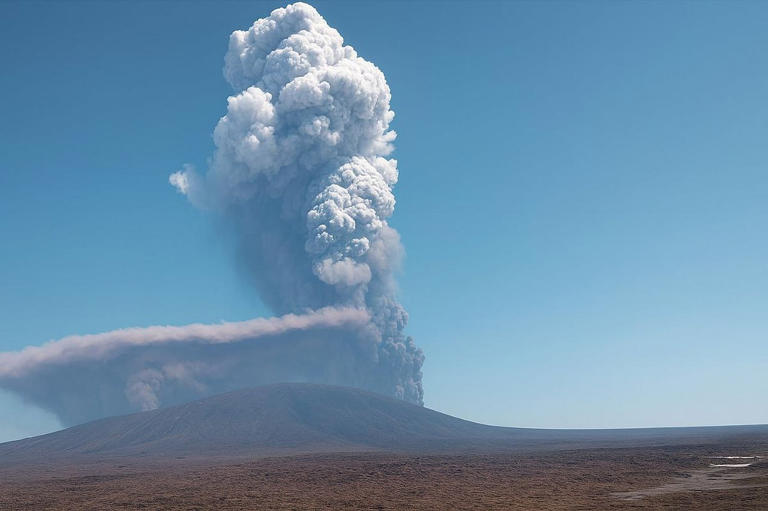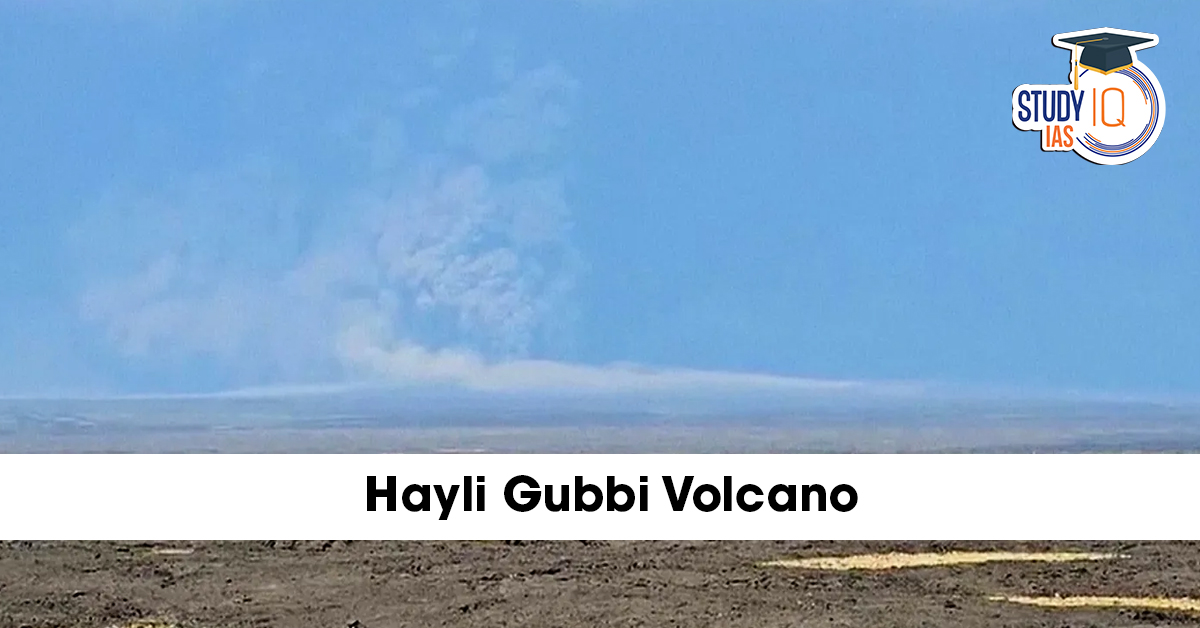Table of Contents
The November 2025 eruption of Hayli Gubbi volcano in Ethiopia has emerged as one of the most significant geographical and environmental events of the year. A volcano dormant for over 12,000 years suddenly erupted on 23 November 2025, producing ash plumes up to 14 km high and affecting airspace as far as India, Pakistan, and Southeast Asia. This article covers every dimension relevant for geography, environment, disaster management, and international relations sections.
Location and Geographical Significance
- Region: Afar Depression, northeastern Ethiopia
- Coordinates: Approximately 13.25°N, 41.08°E
- Geological Setting: Lies in the Danakil Depression within the Afar Triple Junction – the only place on Earth where three tectonic plates (Nubian, Somali, and Arabian) are actively diverging on land.
- Volcano Type: Shield volcano (southernmost in the Erta Ale volcanic range)
- Elevation: 521 m above sea level (but ~120 m below sea level relative to surrounding terrain due to extreme subsidence)
The Afar region is one of the hottest and lowest places on Earth and is considered a natural laboratory for studying continental rifting and the early stages of ocean basin formation.

Why This Eruption Matters in Geography Syllabus
1. East African Rift System (EARS)
- Demonstrates active continental divergence.
- Shows how rift valleys evolve into new ocean basins (similar to the Red Sea formation).
- Current rate of separation: 4–6 mm/year between Nubian and Somali plates.
2. Types of Volcanism
- Classic example of rift-zone volcanism dominated by basaltic magma (low silica, low viscosity).
- Rare phreatomagmatic (magma–water interaction) explosions in a shield volcano setting – explains the unusually high ash column despite basaltic composition.
3. Landforms Associated
- Summit graben, scoria cones, fissure eruptions, lava fields – all visible in satellite imagery of Hayli Gubbi.
Timeline of the 2025 Eruption
| Date | Event |
|---|---|
| July 2025 | Magma dike intrusion begins from Erta Ale volcano, propagates ~30 km south |
| 25 July 2025 | Ground deformation and white steam plumes observed at Hayli Gubbi summit |
| 23 November 2025 | Explosive eruption begins; ash plume reaches 14 km altitude |
| 24–26 November | Ash spreads over Red Sea, Yemen, Oman, Pakistan, and northern India |
| 27 November | Activity subsides; only minor steam emission continues |
Impacts and Inter-linkages
Aviation and Economy
- Hundreds of flights cancelled/diverted in India (Delhi, Mumbai, Ahmedabad) on 25–26 November.
- Volcanic ash advisory issued by Toulouse VAAC extended up to East Asia.
- Highlights the role of Volcanic Ash Advisory Centres (VAACs) under International Civil Aviation Organization (ICAO).
Environment and Health
- Fine particulate ash (PM2.5) reached Delhi-NCR, though meteorological conditions prevented major AQI spike.
- Local Afar communities faced respiratory risks and livestock losses.
Disaster Management Angle
- Ethiopia issued evacuations in sparsely populated areas.
- Demonstrates challenges of monitoring volcanoes in remote, conflict-prone regions.
Key Concepts to Remember
| Concept | Relevance from Hayli Gubbi Event |
|---|---|
| Triple Junction | Afar is the only exposed subaerial triple junction |
| Continental Rifting | Live example of continent breaking apart |
| Magma Dike Propagation | 30+ km lateral dike movement from Erta Ale to Hayli Gubbi |
| Phreatomagmatic Eruption | High ash plume despite low-silica magma |
| Umbrella Cloud | Rare in shield volcanoes; formed due to explosive gas release |
| Hotspot vs Rift Volcanism | Erta Ale range shows both (debated mantle plume influence) |
India-Specific Connections
- Ash reached Indian airspace → direct impact on civil aviation.
- India Meteorological Department (IMD) and Indian National Centre for Ocean Information Services (INCOIS) tracked the plume.
- Relevance under India–Africa cooperation in disaster monitoring and space technology (ISRO–Ethiopian collaborations).
Is Hayli Gubbi Safe to Visit Right Now?
Currently, the area around Hayli Gubbi is off-limits due to lingering ashfall and potential instability. Nearby Erta Ale tours are still operating under strict safety protocols, but all visitors should check the latest advisories before planning any trip to the Danakil Depression.
Final Thoughts
The 2025 Hayli Gubbi eruption is a stunning reminder that even “dormant” volcanoes can surprise us. From its rift-driven awakening to ash clouds drifting thousands of miles, this event highlights both the raw power of nature and the incredible science now helping us understand it.


 US–Israel Attack on Iran 2026: Khamene...
US–Israel Attack on Iran 2026: Khamene...
 Agentic AI vs AI Agents: Meaning, Differ...
Agentic AI vs AI Agents: Meaning, Differ...
 Prahaar Missile System: Range, Features ...
Prahaar Missile System: Range, Features ...




















